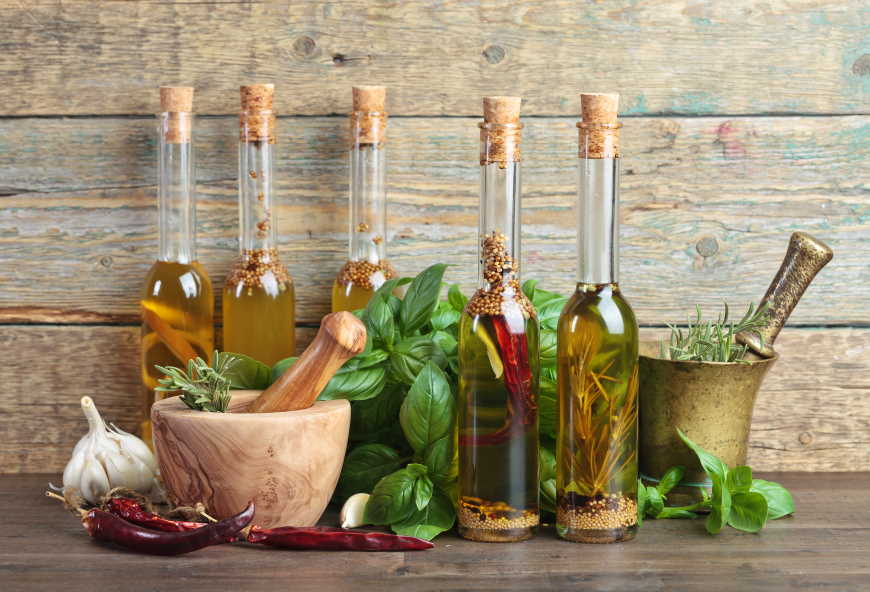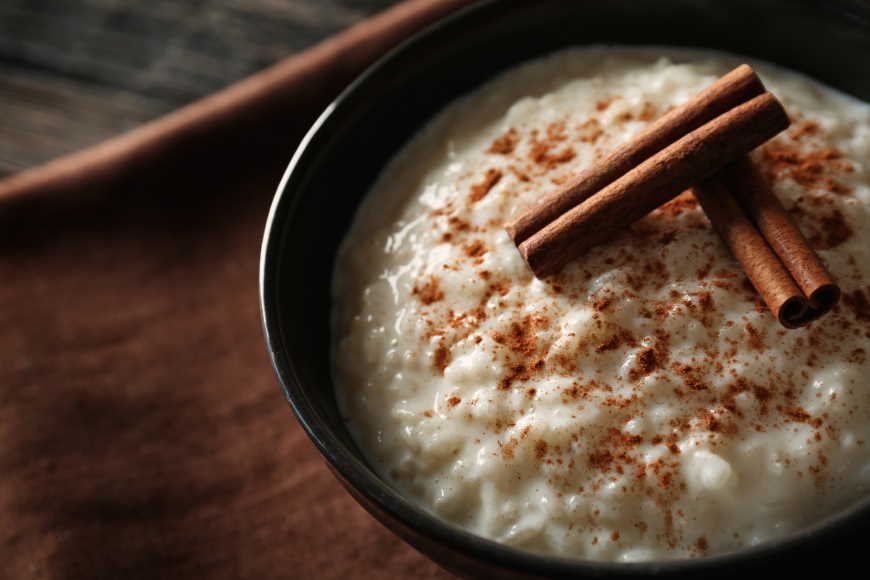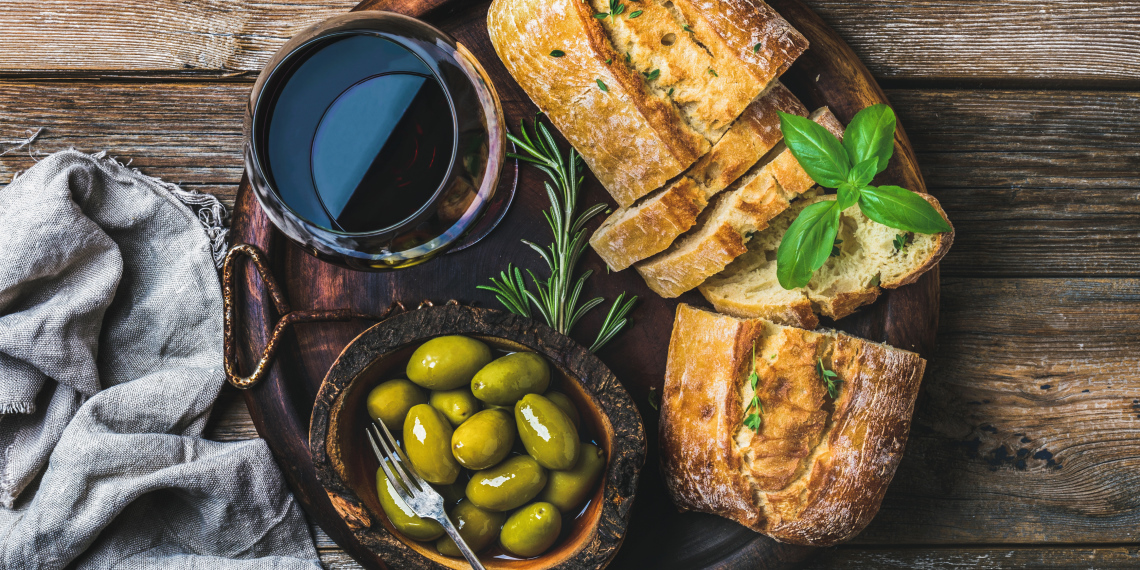One of the great things about the modern world is that if you’re craving some Greek food, you can just drive to a nearby specialty shop, get what you need and make your very own Greek dish from the comfort of your home. Let’s dive right into the flavors of Greece as we explore the delicious world of Greek cuisine.
A Brief History of Greek Food

With over 4000 years of history, Greek cuisine boasts a very long culinary tradition while certain dishes like lentil soup and pasteli (a candy bar made with sesame seeds baked in honey) can be traced all the way back to ancient Greece and are still eaten today.
Along with wine and wheat, olive oil is both the most distinctive and ancient element of Greek cuisine. So central was the role of olive oil to the people of ancient Greece that the spread of the olive tree across the Mediterranean basin and further into parts of Europe is directly correlated with Greek colonization. Wherever the Greeks went, their olives followed them.
In Byzantine times, new ingredients like caviar and basil as well as different spices where added to the local cook books, while the Venetian and Ottoman rule that followed in different parts of Greece introduced even more variety to Greek cuisine that is echoed in the distinct dishes of different regions up to this day.
Food in Greek Culture

Food in Greece is much more than just putting fuel in the body. It is a chance to socialize, discuss current events, have a good laugh, relax, and share a meal with others. Eating as a family at home or going out with friends to enjoy the simple pleasure of eating good food in good company is a big part of the Greek art de vivre and there is seldom a time when you might walk past a restaurant or a taverna and not see at least a few tables of people engaged in lively conversation.
Greek Pantry Basics

There are at least a handful of ingredients that no Greek kitchen will be without. If you’re looking to change up your regular eating habits and add a bit of Mediterranean flair to your cooking, keeping the following ingredients at hand is a good place to start.
Olive oil: If there is one constant theme in Greek cuisine, that would be the generous use of olive oil at every opportunity. Whether it’s for cooking, baking, or simply drizzling over a salad, olive oil is an absolute must.
Feta Cheese: This salty white cheese made with sheep’s milk is one of the best-known Greek dairy products. A necessary ingredient for the traditional Greek Salad recipe, authentic feta cheese can only be produced in certain parts of Greece so pay attention to the designation of origin when shopping for it.
Herbs: Thyme, oregano, mint, and basil are some of the most often used herbs in Greek recipes. If you’re lucky enough to have your own garden and you’re a big fan of cooking, consider planting some fresh herbs so you always have some on hand.
Greek Honey: Made from local bees that feed off the nectar of various indigenous plant varieties like thyme, heather, and orange blossom, Greek honey has been around since antiquity and is often used in traditional dessert recipes.
Yoghurt: Sour tasting and thicker than your average yoghurt, Greek yoghurt is packed with probiotics and is regularly eaten by itself or used as an ingredient in different recipes.
Fresh fruits and vegetables: The fertile Greek landscape is well suited to the cultivation of different agricultural products and you will always find some seasonal fruits and vegetables in a Greek household. Stock up on fruits for dessert and keep some of your favorite vegetables on hand. Chances are good you’ll find more than one Greek recipe that makes use of them.
An Easy Greek Recipe to Try at Home
You don’t have to be a culinary genius to start trying your hand at Greek cuisine, in fact certain recipes don’t require you to do any cooking at all! Just chop up some vegetables, add in some cheese and some herbs, drizzle with olive oil and you’ve got yourself a nice healthy salad in no time at all.
Here is one sweet and easy recipe idea to spruce up your weekly menu and bring some Mediterranean goodness into your life!
Rizogalo (Rice pudding)
Recipe by Argiro Barbarigou, Greek Chef and Global Ambassador of Greek Cuisine.

Making this Greek version of rice pudding is a pretty straight forward process that can take as little as 30 minutes to complete. Don’t let that fool you though, there is plenty of flavor in this no-frills desert!
What you will need
¾ cup of medium grained rice
A pinch of salt
2 cups of water
½ cup of sugar
5 cups of fresh milk
¼ teaspoon of ground mastic (look for this item online or at a specialty shop)
2 tablespoons of corn flour
Some ground cinnamon
Start by adding the rice, water, and salt to a cooking pot and bring it to a slow boil for 10 minutes until the rice pops. Without removing the pot from the heat, add in the milk, sugar, and ground mastic.
Once the rice has boiled, dissolve the corn flour in ½ cup of cool water and add it to the pot while stirring its contents.
Continue cooking the mixture over low heat until it starts to thicken. While it is still hot, split the pudding between 6 bowls and allow it to cool down before moving the bowls to the fridge.
Wait until the pudding has chilled, then remove from the fridge, sprinkle some cinnamon on top and enjoy!
A helpful tip for perfect rizogalo every time!
The secret to getting great rizogalo that is creamy in texture and not too stiff is making sure you keep a slow, steady heat throughout the cooking process.
Discover More of Greece


